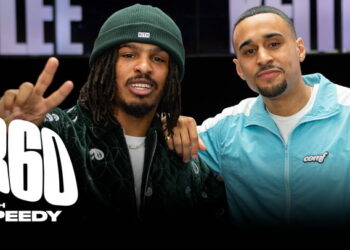In a perfect world, egos would be suppressed and inquisitive minds wouldn’t hesitate to ask questions, no matter how personal or even elementary. But at these types of things—a seminar, symposium, or something like that—when guys would prefer their conversations not be broadcast in front of their peers/competitors, and everyone’s situation is different, the one-on-ones off to the side often are the most impactful.
Grant Williams gets it, since not too long ago he was in the same shoes as the 65 rookies that sat in a hotel conference room in Las Vegas this past August. So he was more than happy to set a neophyte straight after speaking on a panel about one of the most important topics the NBA’s class of 2021 must confront off the court: money.
“Someone said my first purchase is going to be a $100,000 car,” the Celtics forward recalls. “I’m like, ‘You know a car’s value depreciates as soon as you go off the lot.’”
There are a ton of perks when you’re good enough to play in the NBA, the most enticing being the massive amount of money to be made. Salaries for a first-year player start at $925,000 while each first-round pick from July’s draft enters the league with a guaranteed two-year contract that will earn them at least $3 million (before taxes, of course).
But not every rookie will retire in 15 years with “fuck you” money. Nor will every rookie sign ultra-lucrative third and fourth contracts or ink big endorsement deals. Sure, the average NBA player made $7.5 million last season, according to Basketball Reference. But mega earners—guys like Steph Curry, Joel Embiid, and Giannis Antetokounmpo balling on a max deal—inflate that number. The average NBA career lasts a shade under five seasons and even those that carve out a decade or more in the Association—an awesome accomplishment—will almost assuredly walk away from the game with a fraction of LeBron James’ net worth.
So knowing how to properly manage your finances as a newly minted millionaire, with a finite window to maximize earnings, is really, really important. Not just to avoid being another sad story of a pro athlete that went broke, but to make that money last a lifetime and ideally create generational wealth. Balancing it all can be an anxiety-riddled exercise for the NBA’s newest players that, frankly, can’t fathom what life after basketball looks like.
“Compared to everyone else, we make a tremendous amount of money,” says Bucks guard Pat Connaughton. “It’s incredible. It’s a dream. We’re fortunate, the whole nine. But I would say for the vast majority of guys in the NBA, understanding you have to make that last for 30, 40, 50, 60 more years when you’re done playing, that doesn’t always set in until it’s too late.”
“None of us, no matter how long you’re in the NBA, no matter how much money you end up making, you shouldn’t be hurting for money, ever.” — Pat Connaughton
Between jock taxes, state taxes, local taxes, agent fees, taking care of friends and family, and the effects behaviors now can have on your lifestyle later, it’s a lot to process. That’s precisely why the NBA long ago made financial literacy classes, conducted during the league’s Rookie Transition Program, mandatory.
Overseeing it all is Jamila Wideman, senior vice president of player development at the NBA. The Rookie Transition Program, as the league puts it, was created to “promote the personal, professional, social development, and aspirations of NBA players.” While those in the league’s front office and the players themselves can debate what aspect of RTP matters the most, financial literacy unequivocally sits near the top. The educational sessions are more than just a classroom crash course on how to handle money. Wideman paints them as “a framework for decision making as players get their first checks,” and points out that the curriculum has evolved with the rookies.
“One thing that’s true in all of our programming, we try to pay attention to how the guys coming in change over time,” says Wideman. “As we better understand what skills and capacities they are already coming to the table with, what we’re seeing in many ways is young guys coming into the league—there’s a range—but some guys are savvy and are probably in some ways more prepared than generations ago.”
Which is great. And Carmelo Anthony, who has done pretty well for himself financially during his 18 years in the league, largely agrees.
“I know today’s guys, they have the opportunity to learn before they even come into the NBA,” says the new Laker and future Hall of Famer. “I never had that opportunity.”
Anthony entered the league in 2003, almost two decades ago when the internet was way different and Facesmash, the tasteless precursor to Facebook, was the hot thing for horny Harvard bros to waste time on. Rookies nowadays are savvier compared to a generation or two ago, since just about any question can easily be answered via Google and many already have relationships with pros, often thanks to social media, before they step foot into the league. Plus, tales of shady financial advisers bilking clients out of millions—as happened with Tim Duncan and Kevin Garnett—have been amplified in the media, while stories of players going broke—like Antoine Walker—are, for lack of a better term, legendary.
The perils of losing a fortune have always made for sensational headlines—ESPN did a “30 for 30” on it—and always get the attention of rookies when the league has invited players, like Walker, to relay their horror stories. The retired forward, who spent his best years with the Celtics and has been a regular at RTP over the years, notoriously lost out on over $100 million and has been open about how it happened. Multiple bad decisions, failed real estate deals, an extravagant lifestyle, gambling, and, perhaps most poignantly, an inability to tell people around him “no” made Walker an infamous cautionary tale.
But the league would rather highlight resiliency instead of dwelling on disaster, so the rookies are treated to diverse panels featuring past and present NBA players. CJ McCollum of the Trail Blazers, RJ Hampton of the Magic, Connaughton, and Williams are examples of current players—making very different salaries and with very different experiences—who have relayed lessons they’ve learned, connections they’ve made, and successful strategies they’ve used to make their money grow to the rookies.
“It’s a different approach than ‘don’t do this, don’t do that,’” says Wideman. “Guys coming in now are ready to receive a much more positive story and vantage point and ready to do well.”
Normally conducted separately from Summer League, the Rookie Transition Program was held simultaneously with the NBA’s annual desert showcase because it made more sense from a health and safety protocol perspective due to the pandemic. Run in conjunction with the NBPA, it’s been a staple of the NBA offseason since 1986 and it touches on a number of topics—like mental health and social media behavior. The financial literacy portion of the programming gets granular.
The five fundamentals the NBA wants to hammer home, in no particular order, are:
– Understanding basics, like budgeting
– Check writing and bill paying
– Savings, interest, and investments
– Recognizing and understanding fees
– How money relates to family and friends
It’s important for the league to hit on the emotional component of money and that’s arguably the second push. Who the rookies should invite into the process of managing their money and determining who they want to spend it on is emphasized. The league strongly encourages players to continue their financial education and never completely offload the responsibility of managing their money to somebody else, even though almost all will hire some sort of financial adviser. Breakout rooms are set up for those who want to learn more about specific topics. The rookies are also introduced to all the additional offerings provided by the Players Association and the league, like job shadowing opportunities and the Crossover Into Business program that pairs players with Harvard Business School student mentors working on their MBA.
While all of that is awesome and what the rookies learn—and hopefully retain—from the financial literacy curriculum goes way deeper, the most important lesson might be the simplest.
“One of the main messages they said was learn how to say no because there’s going to be so many people trying to get at you and pull at you from different directions,” says Pelicans rookie Trey Murphy III.
Testimonials always hit harder than a slideshow or lecture. Having vets come back, speak, and connect afterward with the rookies is a testament to the seriousness of financial literacy for the soon-to-be young, rich, and famous. “The energy of it demonstrates how important it is and how much guys value it and how much they want to be a support for each other along the way,” says Wideman.
“One of the main messages they said was learn how to say no because there’s going to be so many people trying to get at you and pull at you from different directions.” — Trey Murphy III
A standout point guard at Stanford who was the third pick in the 1997 WNBA Draft, she joined the NBA in 2018 and was promoted to head of player development this past January. Wideman’s overseen the past three RTPs and you can picture her beaming over the phone when she talks about Williams and Connaughton returning to relay their wisdom to a new rookie class.
“I have a passion not just for looking out for NBA guys because of where I’m at, but pro athletes in general,” says Connaughton. “None of us, no matter how long you’re in the NBA, no matter how much money you end up making, you shouldn’t be hurting for money, ever. You should never be put in a position where you’re struggling financially if you’ve played in a professional sports league nowadays.”
He’s not wrong, considering the insane money NBA players make today compared to 20 years ago. The salary cap for the 2001-02 season was $42.5 million. Six players will make $40 million or more this season and, according to ESPN, 127 will make at least eight figures. Upon entering the league in 2015, Connaughton was probably better positioned to build wealth than some other rookies despite being a second-round pick. He took finance courses at Notre Dame and had a general background in real estate thanks to his father’s business in his native Massachusetts. But Connaughton still had to be good enough to stay in the league and earn multiple contracts with a salary that places him firmly in the NBA’s middle class, levels below the league’s superstars. A six-year vet who can become a free agent next summer, the NBA has asked him to be a panelist the past several years because of his passion for the subject and powerful testimonials.
“It’s the real examples that I can provide to the kids that’s going to catch their ears,” says Connaughton, who first appeared on a financial literacy panel at RTP in 2018. “How I made money in real estate, because that’s what I know best, but how you may have lost money elsewhere or how you didn’t maximize a relationship that could’ve helped you save money elsewhere. Or you give real examples, real dollars, real cents, real ways it works and at a high level. I’ve found that makes guys want to follow-up and learn more about why it happens because a lot of them don’t understand why their contract says they’re going to make $5 million but they’re only ending up with 2.5.”
Wideman loves to see rookies make connections with established vets at RTP who can serve as financial mentors, like McCollum has with Connaughton and like Connaughton has with Williams. Three Leaf Development, Connaughton’s real estate company was established in 2015 and has built (and sometimes sold) condominium projects and custom home construction in Boston, Portland, Milwaukee, South Bend, Indiana, and Florida. A venture like that sounded attractive to Williams when he was a rookie, and he’s now one of 25 players who are active investors with Connaughton’s company. The NBA champ says roughly 40 additional players have reached out with interest in investing in his projects or with questions about the real estate business in general. What neither he nor the NBA wants are players haplessly throwing money at something.
“I’ve had two guys say, ‘I’m going to give you a million bucks. In a year and a half you’ll give me back four.’ Well, no, that’s not how real estate works,” says Connaughton. “That’s more of a venture capital investment and, quite frankly, this isn’t going to be a good fit.”
Williams says a few rookies reached out to him post-RTP, but specifically mentions Corey Kispert. The way Connaughton has served as a mentor to Williams, Williams is doing the same with the Wizards rookie who was the 15th selection in July’s draft. Even though he’s still learning, the 22-year-old Williams, who entered the league in 2019, is more than happy to help a novice navigate the ins and outs of becoming and remaining a multimillionaire.
“I remind people that it’s a brotherhood,” says Williams. “We’re all here competing for the same spots so basketball-wise, it’s going to be competitive. But off the court we’re Black, white men that are trying to not only build wealth for ourselves, but generations for our families. [Some] people are going to be more willing than others, but take advantage of those people that are willing to speak with you.”
Prudence and massive paychecks often aren’t a mix when excess and opulence are glorified on social media. But at the very least every rookie who’s participated in the league’s financial literacy curriculum should come out way wiser. Murphy says he feels “a little bit more secure” about managing his future fortune after RTP. He also admits to a healthy dose of apprehension.
“I still feel like I’m a little nervous at the moment because you want to spend, but you also don’t want to go broke,” says Murphy. “You try to put limits on yourself, but I’ve talked to a bunch of guys in the league now who say their rookie year they were scared to spend money. But you realize you’ll be in a good spot, you’ll be fine.”
Murphy doesn’t plan on splurging when he finally gets his first NBA check in November. He already has a nice enough car, plus, he points out, the real money comes with your second contract. The 17th selection in the draft wants to settle in with a monthly budget before his first big purchase. Proving the kids will be all right, when the vets on the Pelicans inevitably make the rookie pay for an expensive dinner, strict rules will be in place.
“I’mma tell them they get one entrée, no appetizers,” says Murphy.







